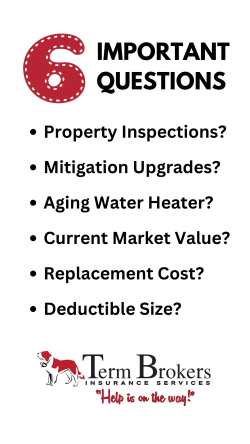At Term Brokers, we specialize in helping our customers get the best Florida homeowners insurance rates. We do this by ‘reshopping’ your policy with our extensive network of Florida insurers. To prepare us for the ‘reshop’ we recommend you have answers to the following questions.
We understand that rates have been climbing seemingly without end. The good news is nine insurers have recently filed with Florida’s Office of Insurance Regulation to reduce rates by as much as 10%. Now is a great time to discover how much we could help you save on your policies.
Your answers to these questions will help us find the very best rates for your Florida home!

Has there been a recent “inspection” of your property?
Many insurance companies require homeowners to give them inspection access to the insured property. They do this to help assess the risk and cost of repair. A poorly maintained home will drive up insurance rates or result in a decline in coverage.
Some insurance companies use drones to obtain aerial views, which can reveal roofs missing shingles or other problems of concern to the insurer.
The insurance company ‘should’ have provided a report after the inspection. If they did not, you may consider completing your own inspection. Hence, you are fully aware of any risk issues and can address them.
Have you made improvements to your property since your last policy was written?
Insurance companies will be most interested in items that reduce risk—new roofs, new utilities, or, better yet, raising utilities above base flood elevation (BFE) and making wind mitigation improvements.
Improvements often increase the value of your property, which, in turn, could increase your insurance costs. The savings from wind and flood mitigation discounts will usually save you more than upping the value of your home.
How old is your water heater?
We just mentioned utilities, but water heaters deserve special mention. Older water heaters can dramatically raise rates or even result in declines to provide coverage. It would be best to have a drain pan with piping that directs water outside your home. If your water heater is no longer under warranty, consider replacing it with a new one.
Do you know the current market value of your home?
Ideally, you insure your home for its actual value. However, some homeowners may underinsure their homes to reduce insurance costs. Many insurance companies do not allow this, as it can lead to problems such as lawsuits after a claim is filed. If your home is mortgaged, your lender may also require you to have full coverage. The easy way to get a quick market value estimate is Zillow.
Do you know the cost of rebuilding your home should disaster strike?
Replacing your home can cost much more than its current market value. The three major factors are current code requirements, labor, and material costs. A replacement home must be built above BFE and meet more stringent code requirements. Inflation in recent years has run hot, driving up labor and material costs.
While an insurance company will likely use a software estimation tool to make this assessment, you can make a quick back-of-the-envelope estimate. New homes currently cost $150 (basic) to $280 (mid-grade) to even $400 (luxury) per square foot to build. Take your home’s square footage and multiply it by the cost per square foot for the grade of the house. This estimate provides a starting point to provide your agent.
What size deductible can you afford?
Higher deductibles result in lower premiums. They eliminate the risk of low $ claims and, if high enough, can reduce mid-size claim values too. Not everyone can afford a $20,000, $40,000, or even higher deductible, but high deductibles make a big difference in premium costs. One way to manage a higher deductible is to establish a line of credit that matches the deductible, which will only be used for ’emergency’ purposes.
Conclusion: Step-by-Step Guide to Getting the Best Florida Homeowners Insurance Rates
Armed with this information, you’re well-prepared to partner with Term Brokers to secure the best possible homeowners insurance rate. By understanding your property’s specifics and exploring various coverage options, we can work together to find a policy that protects your home and fits your budget. Contact us today for a free quote and experience The Term Brokers Difference.
Did you like this article? Check out our recent three-part series on Florida flood insurance.
